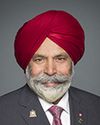Thank you, Dr. Sareen; thank you to our guests.
Natalie, that was incredible testimony, as always. We know that.
I want to mention two points. We talk a lot about our first responders regarding the bill. In the bill, it's not just our first responders, but it is our veterans and our military, those who put their uniforms on every day to serve our communities and our country. I just want that mentioned.
Also, Dr. Sareen, you mentioned what the military, our Canadian Forces, have been doing very well in the last six or seven years. The R2MR program, the road to mental readiness, is exactly what our colleague Mr. Webber was talking about, and the framework of the bill or the gist of the bill is to get those best practices applied right across our country.
For the information of my colleagues who are here, an RCMP who is serving in Nova Scotia and is dealing with PTSD may not be eligible for services in British Columbia. So it's to make sure that there's consistent care and diagnosis right across the country. I'm just using that as one example.
I want to direct my comments to Natalie.
Natalie, you are an accomplished author and you have shared your experience, which is really changing the views of PTSD and giving people a look inside your head, if I can put it that way, during your darkest times. You have a blog that you started writing as you were hospitalized, and out of that you wrote a book called Save-My-Life School: A first responder's mental health journey. I would like you to talk a bit about both the blog and Save-My-Life School , if that's possible.





